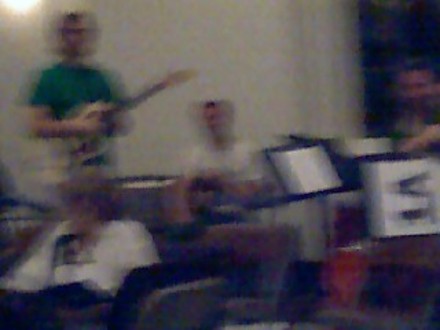It was a quadraphonic experience. Alex Cline, 15-year co-director of the monthly Sunday Evening Concerts series, had his drum mess piled up in the "stage" area of this old library, at the end under the big window that showcased the neon insurance sign across the street. More drums, music stands, amps, keyboards & such were jammed up there by him. Along each side of the room, behind rows of columnar archways, lurked four standup bassists as well as woodwind players, brass players, guitarists, percussionists, singers. More than two dozen musicians, all previous participants in the series, were here to blow. Joe Berardi, Tom McNalley, Rich West, Vinny Golia, Jie Ma, Steuart Liebig, William Roper, Carey Fosse, Charles Sharp, Wayne Peet, Will Salmon, Andrew Pask, Kaoru, Emily Hay, Alan Cook, Anthony Shadduck, Brad Dutz, Dorothea Grossman -- those were just the ones I could name on sight.
You might hear Salmon's flutes from behind, Hay's vocal wails and Kaoru's electronic loops from one corner, Peet's organ from another, Golia's sax and Roper's tuba from one side, West's whirling whip device behind your left ear. Music is the place where everyone can talk at once and still get understood.
Sure, free improvisation reigned -- that's what these people do. Mostly they didn't jam all at once; Cline would beckon for this one or that to trot up and solo, or for groups of five or nine to enter colloquy. It went in and out of phase, the way freedom will, hitting a special groove when Cline laid down a torrent with his mallets and McNalley (who's formed a seasoned alliance with Cline) skipped rapidly over the stream on guitar.
Grossman parked herself in her wheelchair up front to do her call-and-response thing: She would knock out a few lines of her poetry, and the musicians would reflect the blooming flowers, the fading helicopters, the Henny Youngman apotheoses, whatever. These made for some of the evening's best moments -- because the format provided an instant group focus; because if one minute didn't congeal, another inspiration was coming right up; because of the musicians' longtime love for Grossman, an ever-present avant attendee for decades; and because, as she noted, a lot of these people wouldn't know free improv from free lunch if not for her late husband, pianist Richard Grossman.
Series co-director Salmon let his supple vocal cords fly on a Rilke poem early on, and closed the evening by conducting a beautiful old shape-tone hymn adapted to embrace both peace and piracy. The large ensemble lent it the right level of solemnity, spirituality and occasional absurdity.
Grossman said it felt like a family. Many families are this strange, not many this connected.
PHOTOS BY FUZZY BRAQUE

